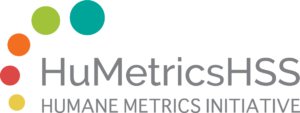Creating Agents of Change in the HuMetricsHSS Fellows Program
Over the past decade, many colleges and universities have developed publicly stated diversity, equity, and inclusion goals. However, while senior administrators may point with pride to mission statements and strategic plans that proclaim these institutional commitments, often leaders do not have the tools, budget, or political will needed to operationalize these initiatives.[1]
The same is true of professional development designed to actualize these professed values. Equity workshops for instructors can be incredibly motivating and inspiring. I myself have been intrigued by concepts that help address discipline-specific oppression in my field of English composition, such as white language privilege,[2] asset vs deficit approaches to student work, un-grading, open pedagogy, anti-racism, and culturally responsive teaching. Presenters at such workshops speak of meaningful assignments that focus on complex histories of oppression and power in our culture and of engaged students who see themselves and their stories reflected in course content.
However, this type of training often does not address the political realities that occur when instructors attempt to implement social justice topics in the classroom. In a nation where teachers can be fired for speaking about “woke” topics,[3] including actual historical events, and students can garner media attention for complaints about their “liberal” professors, instructors may be left unsupported as they aim to create a more socially just environment for their students.
With the help of the HuMetricsHSS Fellowship, as well as my participation in the Open Education for a Better World mentoring program and the Open Oregon OER Course Redesign Spring Spring event, I have created sharable courseware to serve instructors, especially part-time instructors who feel isolated as they attempt to make their classrooms more inclusive in communities that resist any such changes.
Recently uploaded to my Google Classroom, “Equitable Approaches to Composition” encourages students to investigate the process by which knowledge is created in the academy and in our culture. Through readings and writing assignments based on bias in technology that might initially appear “neutral” to untrained eyes, the course empowers students to challenge dominant culture in communities that strongly resist such questioning of the status quo.
I remain deeply grateful for the external validation and financial support provided by this fellowship, which enabled me to earn a Creative Commons Certificate and complete other training. Further, I was grateful that the program built accountability into this endeavor by holding bimonthly meetings with other fellows.
Our meetings created an interesting space because we came from a variety of institutions—large universities, small liberal arts colleges, and community colleges. Further, our projects varied widely in scope and complexity, as did our perceived notions about the institutional climates we faced.
During these meetings, we initially thought we were reporting issues particular to our institutions and our projects—a dean reluctant to fund a key workshop, a division terrified to even talk about racial issues, colleges undergoing radical leadership changes in a very short time, deep budget cuts to departments whose support we had counted on to complete our projects, and campuses that were somehow inert and chaotic simultaneously.
Yet we soon saw a few common themes emerge. (“Oh, that happened here a few years ago.” “We have that problem, but that person is about to leave.” “Oh, let’s talk after this meeting, I have some ideas to share with you.”) In our time together we encouraged each other and strategized to address speed bumps in our attempts to inspire cultural change.
In fact, the more my colleagues described the specific political, philosophical, and practical challenges they faced, the more I heard echoes of my own story. I believe we all saw these connections.
HuMetricsHSS values align with my work because of my interest in interrogating traditional academic practices as inherently oppressive by design. Centuries ago, colleges were established to serve wealthy, privileged students with very different experiences and resources than the students who enroll at community colleges and many universities today. The same tools we have inherited from a colonial enterprise that was designed to exclude most and deepen inequities in society cannot be used to create a system that serves and transforms the lives of our students and their families.
My time in the HuMetricsHSS Fellowship Program enabled me to contextualize my journey towards culture change in ways nothing else could. Although I doubt any of us in the program would claim that we had accomplished all of our project goals, it was clear that we had uncovered a benefit I did not anticipate: a community of like-minded people, also vexed by a number of obstacles but also inspired by the possibility of human-centered changes in the academy. Creating community is clearly the first step to transformation, as Ruth Bader Ginsburg explains, “Fight for the things that you care about, but do it in a way that will lead others to join you.”[4]
References
[1]The HuMetrics Team addresses many facets of these contradictions in the 2020 white paper, “Walking the Talk: Toward a Values-Aligned Academy.”
[2] Asao Inoue has written about addressing white language privilege, antiracist writing assessments, and labor-based grading contracts.
[3]The open hostility to inclusive values has recently impacted text on university websites and even job titles.
[4] Alanna Vagianos. “Ruther Bader Ginsberg Tells Young Women: ‘Fight for the Things You Care About.” Radcliffe Harvard Institute Newsletter. June 2 2015.
